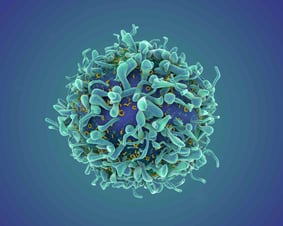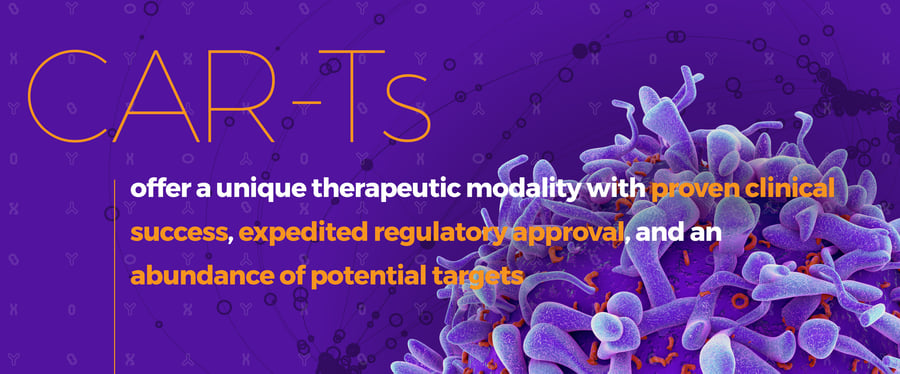6 min read
CAR-T Cell Therapy 101
Chimeric antigen receptor (CAR-T) cell therapy
A growing number of CAR-T cell therapies are being developed and tested in clinical studies as an innovative approach to reprogram the patient’s immune system to attack its own abnormal cells. For treatment of certain cancers, as well as other diseases, this is a huge leap forward.
How does CAR-T cell therapy work?
Specifically trained to target
The innate immune system functions by discriminating against and attacking foreign cells and pathogens, as opposed to cells of the body. So, if abnormal cells that are not foreign (such as tumor cells) begin proliferating at high rates, these familiar cells are generally not targeted by the immune system and allowed to continue multiplying unchecked.
When disease cells such as these find ways to evade the immune system, the body’s T-cells need to be retrained to recognize, hunt down, and kill them. CAR-T cell therapy aims to sharpen and strengthen the inherent disease-fighting powers of the immune system by treating patients with modified versions of their own T-cells, genetically engineered to produce a hybrid receptor molecule (the CAR) that targets these abnormal cells.
Some of these disease cells may display specific antigens, either at abnormally high levels, or that are unusual to the particular cell type or environment, and cells (or antibodies) can be engineered to recognize and target them.
Built from blood
In CAR-T cell therapy, T-cells are collected from a patient’s blood, then specifically re-engineered to express precise CAR structures on their surface. Once these CAR-T cells are infused back into the patient’s bloodstream, these new receptors allow the T-cells to recognize a specific antigen on the patient's abnormal cells, bind to it, and launch a precision attack.
So far, the FDA has approved CAR-T cell therapy products for use in treating relapsed or chemo-resistant patients with adult B-cell non-Hodgkin’s lymphoma or childhood acute lymphoblastic leukemia (ALL). Now, clinical trials are already moving CAR-T cells into use as a first or second line of treatment, and in some high-risk cases, using it to replace stem cell transplant therapy altogether. It could also prove useful in therapies treating autoimmune disease and neurological disorders that result in the degeneration of the body’s cells such as Alzheimer’s.
Why is CAR-T cell therapy is so important right now?

Long-term benefits
CAR T-cell therapy is a living drug with benefits that can last for many years. As the engineered T-cells can remain in the body long-term, they will continue to expand, recognizing and attacking the same abnormal cells if and when they encounter them. In a trial with data continuing to evolve, after 15 months, 42% of adult lymphoma patients who received CD19 CAR-T cell therapy were still in remission. Additionally, two-thirds of childhood ALL patients were still in remission after six months. These are patients whose cancers were deemed very aggressive and for whom other standards of care had failed.
Shorter, singular treatments
A major advantage to CAR-T cell therapy is treatment time. A single infusion usually requires under two weeks of inpatient care―in contrast to at least six months of chemotherapy for newly-diagnosed [non-Hodgkin’s lymphoma and childhood leukemia] patients. Also, when using chemotherapy in autologous stem cell transplants, there’s a known risk of toxicity to underlying hematopoietic stem cells and a concern about the ability to collect an adequate number of stem cells.
When CAR-T cells bind abnormal cell antigens and are activated in a patient’s body, they create the cytokines necessary to kill the targeted abnormal cells. The flood of cytokines into the blood during CAR-T cell therapy can lead to a condition called cytokine release syndrome (CRS), or cytokine storm, producing symptoms ranging from mild and flu-like to states of tachycardia, hypotension, hypoxia and organ failure.
However, CRS grading systems and treatment algorithms have been established as part of each treatment protocol, allowing emerging groups who are developing new and unique CAR-T constructs to study the data in an ongoing attempt to address this issue. And as CAR-T therapy is a one-time infusion, the side effects don’t last as long as those from cyclical treatments like chemotherapy.
Lower barriers to treatment
Regarding eligibility, more than half of patients without chemosensitive disease are not considered for autologous stem cell transplant. In trials on patients who had undergone previous stem cell transplant and chemotherapy regimens for certain lymphomas, CAR-T cells produced a lower one-year treatment-related mortality rate than autologous stem cell transplant.
As the FDA is working to refine and update the regulatory requirements for these promising new therapies, there is currently a lower bar to entry to get CAR-T therapies approved. Many of the more stringent requirements in place for other biotherapeutic classes to gain approval do not (currently) apply to cell therapies―meaning these new treatments can reach the market and be offered to patients faster, and with potentially lower developmental costs. As this new science is a changing landscape, the time is right to research these therapies now, in anticipation of future updates.
How important are antibodies in CAR-T cell therapy?
Antibodies are critical to constructing a CAR
The CAR of a CAR-T cell, has two functions. The first is to bind the abnormal cell antigen with high affinity and specificity. The second is to transmit a signal to activate the CAR-T cells. CARs obtain these functions by combining into one protein, a domain of an antibody that recognizes the abnormal cell antigen with intracellular T-cell signalling domains that are capable of activating the T-cell. A successful CAR-T cell therapy relies on the specific and high-affinity (e.g., unique and tight) binding of the CAR to an abnormal cell antigen. This is best obtained through the use of the binding domain derived from an antibody. Their incredible specificity and affinity makes antibodies the most efficient choice to tailor CAR-T therapies to a particular target.
Better antibodies, best chance for success
Although modified antibodies have been studied for decades, their broad potential for impact in CAR-T therapy is only now being fully recognized.
The human antibody repertoire can generate infinite and distinct antibody molecules with a large range of differences in specificity and affinity. Transgenic, human antibody producing rodents, can be used to directly obtain the antibody domain for the CAR. However, eliciting and discerning the best antibody intended for a CAR can be a unique challenge. Some abnormal cell antigens may prove difficult to raise an antibody response. Low expression levels of the abnormal cell antigen may mean only the tightest binding antibodies will be effective in the CAR. Appropriate antigens must be generated and used to identify antibodies binding an exposed or unique domain of the abnormal cell antigen.
Not just the antibody per se, but the sequence
An additional unique challenge for obtaining antibodies for a CAR is not just the generation of the antibody, but obtaining a nucleic acid sequence of the antibody that can be used to recombinantly engineer the CAR construct having an antigen binding domain. While multiple sequencing platforms have come into the mainstream of drug discovery, each platform and target of the platform presents a unique challenge to obtain antibody sequences quickly, cost-effectively, and with high fidelity.
Discovery without limits
It is an unprecedented time of CAR-T discovery. CAR-Ts offer a unique therapeutic modality with proven clinical success, expedited regulatory approval, and an abundance of potential targets. However, discovering high-quality, expertly developed antibodies to CAR-T targets can still be a long, exhausting and expensive process that requires not only specialized proficiency, but also knowledge of possible pitfalls.
Companies focusing on speed to market would benefit from a specialty science partner with deep expertise in immuno oncology and experience producing verified antibody sequences that can advance groundbreaking CAR-T therapies. A partner that stays abreast of emerging discovery targets and enabling technologies is critical in providing needed antibody content for the fast-moving CAR-T therapeutic landscape.
Since 1995, Antibody Solutions has conducted thousands of discovery campaigns for small cell antigens like the ones in CAR-T. With deep expertise in immunology and immuno-oncology, we apply a customized applications-based approach to generate fit-for-purpose antibodies and then provide valid gene sequences of the antibodies to build your CAR constructs. For more information, please contact us at inquiries@antibody.com or 888.843.1069.

Author of more than 40 publications, John’s current research interests include new technologies for improving therapeutic antibody discovery, properties of next-generation antibody-like molecules, and best practices for critical reagents used in biologics development.






